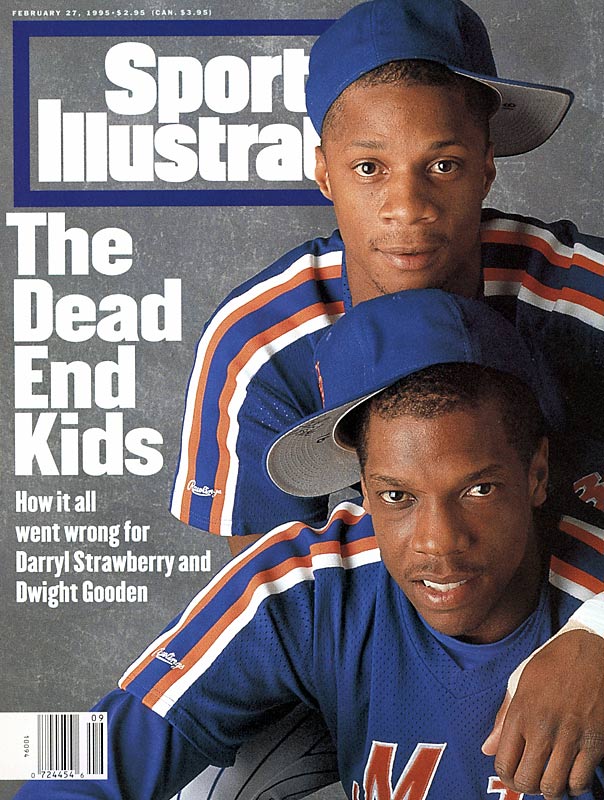 I am not entirely sure, because I haven’t met him yet, but I suspect that if you asked Darryl Strawberry what he was most proud of, it wouldn’t be his 335 home runs in 17 seasons or his four World Series wins. It probably wouldn’t be anything at all to do with his Major League Baseball career.
I am not entirely sure, because I haven’t met him yet, but I suspect that if you asked Darryl Strawberry what he was most proud of, it wouldn’t be his 335 home runs in 17 seasons or his four World Series wins. It probably wouldn’t be anything at all to do with his Major League Baseball career.
Darryl’s father, a gambler and alcoholic, would beat Darryl and his brothers with an extension cord. His parents would fight night after night until one night when Darryl was thirteen, he and two of his brothers had enough. They fought back and ordered their father to leave. After that, his mother raised Darryl and his four siblings on her own.
When you read about his life, you see the adult future of one of our kids: a childhood riddled with what we now call traumas and ACE’s (Adverse Childhood Experiences); severe physical and emotional abuse from his father; a young adulthood filled with drug and substance use; troubled relationships; anger; violence; jail; and a whole lot of feeling alone, empty and not quite worthy enough. At least that is how Darryl’s life reads to me.
In a 2009 Time Magazine interview, Darryl is quoted as saying, “I think people just portrayed me as this person that had everything, and just didn't appreciate it. They had no idea I had these issues in me from day one.”
Fast forward to today and you see a changed man. A man who has found some peace. A man who still struggles, but a man who now fills his holes by caring for others. Who seems to shy away from being a role model – perhaps more of that feeling of unworthiness popping up – but readily embraces his role as a missionary for someone else. His new role is leading people to Jesus. Helping them to feel some of the peace in their souls and love in their hearts he has been learning to accept.
I think if you asked Darryl Strawberry what he was most proud of, it wouldn’t be what he did; it would be what he gives.
Darryl Strawberry has said, "I'm not ashamed of who I am. Of course I'm ashamed of the things that have happened. But with life experiences, you're able to give back and help others."
And that is exactly what he does.
Darryl Strawberry is the guest of honor at Family & Children’s Aid’s Kids Cup Golf Classic on May 23, 2016. The Kids Cup Golf Classic includes a dinner and auction. It is held at Richter Park Golf Course in Danbury, CT. Visit www.fcaweb.org/golf for more information about the Kids Cup.
About Family & Children’s Aid
Family & Children's Aid (FCA) is a 501(c)(3) that provides high quality, innovative, behavioral and mental health care to children and their families. The children we serve represent the full spectrum of mental health needs, from Autism to profound trauma as a result of abuse and neglect. Our therapeutic techniques help children heal so they can choose their own futures rather than allowing their experiences and illnesses to dictate their futures for them.
Family & Children’s Aid has been a haven for at-risk youth and children in crisis for over two hundred years. Born of the era when settlement houses and asylums began to replace poorhouses, today’s Family & Children’s Aid has evolved to meet the emotional and mental health needs of contemporary children in effective, evidence-based, and innovative ways.
In addition to individual, group and family therapy, FCA offers 20 additional therapeutic programs for children and their families including an after school program for children with emotional and behavioral issues, in-home parenting support for parents of children who are at-risk of abuse or neglect, a respite program, a therapeutic foster care program, a teen substance abuse treatment program, in-home intensive psychiatric support, Life Is Good® Playmaker groups to teach children to learn to play again after a traumatic experience, PeaceLove and other expressive art programming, as well as two adolescent therapeutic group homes and a shelter for homeless mothers and their children.
For the families that seek services, 40% to 50% end treatment too soon because of lack of access, lack of transportation, or financial constraints.